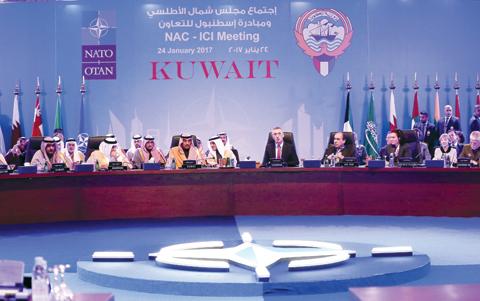FM to deliver letter to Tehran - Trump 'fully' committed to NATO
 KUWAIT: (Top) A general view shows the meeting between members of the North Atlantic Council (NAC) and the Islamic Cooperation Initiative (ICI) attended by NATO members at the newly-opened NATO Istanbul Cooperation Initiative (ICI) Regional Centre in Mishref.
KUWAIT: (Top) A general view shows the meeting between members of the North Atlantic Council (NAC) and the Islamic Cooperation Initiative (ICI) attended by NATO members at the newly-opened NATO Istanbul Cooperation Initiative (ICI) Regional Centre in Mishref.KUWAIT: NATO chief Jens Stoltenberg yesterday called for boosting security cooperation with the Gulf states as the Western military alliance opened its first office in the region. "It will be a vital hub for cooperation between the alliance and our Gulf partners," Stoltenberg said at the inauguration of the center in Kuwait in the presence of HH the Prime Minister Sheikh Jaber Al-Mubarak Al-Sabah. The center is based on the Istanbul Cooperation Initiative (ICI), which was launched by the NATO leaders in 2004 and aims to boost security links with the Middle East, in particular Gulf Arab states.
Kuwait, Qatar, Bahrain and the United Arab Emirates are members of ICI, while the remaining two Gulf Cooperation Council (GCC) states - Saudi Arabia and Oman - plan to join. Kuwaiti Foreign Minister Sheikh Sabah Al-Khaled Al-Sabah said the region is facing serious challenges that require cooperation with international organizations.
"We face common security threats like terrorism, weapons proliferation, and cyber attacks. And we share the same aspirations for peace and for stability," Stoltenberg said. "So it is essential that we work more closely together than ever before. We have now developed individual cooperation programs with all our Gulf partners," he said. Stoltenberg said that over the past year, NATO has trained hundreds of Iraqi officers in Jordan to better fight the Islamic State group. "We are now extending our training and capacity-building efforts into Iraq itself," he said.
NATO continues to fight terrorism in other ways, including with direct support to the anti-IS coalition, he said. The center will strengthen the military-to-military cooperation and the fight against terrorism and extremism, Stoltenberg said. The center will help the Gulf states by providing advanced training courses on cyber security, energy security, chemical, biological and nuclear weapons.
Kuwait's foreign minister added he will visit Iran to deliver a letter from HH the Amir on the troubled ties between the Islamic republic and its Arab neighbors in the Gulf. The letter from HH Sheikh Sabah Al-Ahmad Al-Sabah to be delivered today deals with "Gulf-Iranian relations and the basis of dialogue and cooperation" between the two sides, said Sheikh Sabah Al-Khaled. "Gulf states have a true desire that relations with Iran are normal and based on international law," he told reporters after attending the inauguration of the NATO center. "We are partners in this region and have common interests and huge potential," Sheikh Sabah said, calling for a "normalization of ties and opening dialogue".
Meanwhile, Stoltenberg said the new US administration was "fully committed" to the Western military alliance despite strong criticism from President Donald Trump. "I am absolutely certain that President Trump and the new US administration will be fully committed to NATO and to the transatlantic partnership," Stoltenberg said. The NATO chief also said he had received assurances from both Trump and his Defense Secretary James Mattis of continued US support for the alliance.
"I spoke with President Trump a few days after he was elected in November and he conveyed a very strong message to me that he personally was very committed to NATO and the transatlantic partnership," Stoltenberg said. He said he also spoke with Mattis on Monday, "who expressed strong support to NATO". "I am absolutely certain that the new US administration ... will support strengthening NATO," he said.
The NATO chief said he totally agreed with Trump and Mattis that European financial contributions to NATO must increase. "European allies have to spend more, have to invest more on defense... We have seen some progress but there is a long way to go," Stoltenberg said. The Pentagon said on Monday that Mattis reassured NATO allies that Washington had an "unshakeable commitment" to the military alliance, despite Trump having previously deriding the organization as "obsolete". - Agencies










